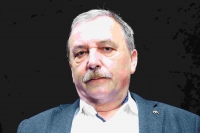Let’s not forget that before November 1989, Czechoslovakia was a midnight kingdom where dancing and singing was forbidden
Dalibor Horák was born on June 4, 1965 in Vítkov near Opava. His father František Horák spent his basic military service as a member of the Inner Guard and as such he took part in the suppression of protests against the currency reform in Pilsen in 1953. After graduating from a military school in Prague, he worked as a politician at the Bytíz labor camp, where he realized that the communist regime was not what it seemed to be. He worked as a teacher in Štáblovice. Because of this, the family moved to Uničov, where Dalibor joined the grammar school at the end of the 1970s. Uničov Grammar School was famous for the fact that there were teachers who were fired from other schools. Dalibor met with underground culture and as a talented musician he started to play with the well-known underground band Brix Bar Band. The band performed at secret festivals of the other culture, which, however, often ended prematurely by police intervention and the band performance was often cancelled. Dalibor enlisted in the army, but after a while he got the so-called blue book and was exempted from service for health reasons. He never returned to the underground community. He took part in a demonstration on August 21, 1968 in Prague, signed a petition for the release of Václav Havel. In the post-November era he joined the Civic Democratic Party, served as mayor of the town of Uničov and since 2016 as deputy governor of the Olomouc region.
